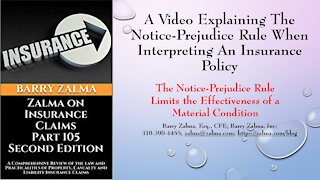Premium Only Content

A Video Explaining the First Party Property Insurance Adjuster's Duties and Obligations
An “adjuster” or “insurance adjuster” is by statutory definition, a person, co-partnership or corporation who undertakes to ascertain and report the actual loss to the subject-matter of insurance due to the hazard insured against. Insurance companies create, by issuing an insurance policy, a contractual obligation to pay its insureds’ valid claim. To do so insurers understand that the person insured is not able to prove the cause and extent of loss without assistance. Therefore, insurers dispatch a person with special knowledge – the adjuster – to separate fact from fiction, to establish cause and origin of the claimed loss, and determine sufficient information to enable the insurance company determine the amounts necessary to indemnify the insured as the policy promised. The adjuster is also present to distinguish the valid claim from a claim for which the insurance company is not liable under its policy.
Some policies specifically state that the claimant must use his own judgment in estimating the amount of loss and that the assistance of an insurance adjuster is a “courtesy only” — the claimant must still send a proof of loss within 60 days after the loss even if the adjuster does not furnish the form or help you complete it. As a general rule, when an insurer gives its insured written notice of its desire that proof of loss under a policy of fire insurance be furnished and provides a suitable form for such proof, failure of the insured to file proof of loss within 60 days after receipt of such notice, or within any longer period specified in the notice, is an absolute defense to an action on the policy.
-
 10:17
10:17
Barry Zalma, Inc. on Insurance Law
1 year agoWho's on First - Defense and/or Indemnity
195 -
 11:38
11:38
Barry Zalma, Inc. on Insurance Law
5 years agoA Video Explaining that the First Party Property Policy is a Contract of Personal Indemnity
101 -
 20:42
20:42
Barry Zalma, Inc. on Insurance Law
5 years agoA Video Explaining the Duties of the Public Insurance Adjuster
66 -
 16:42
16:42
Barry Zalma, Inc. on Insurance Law
5 years agoA Video Explaining Casualty Insurance
78 -
 17:29
17:29
Barry Zalma, Inc. on Insurance Law
5 years agoA Video Explaining the Nature of Insurance Underwriting
36 -
 16:33
16:33
Barry Zalma, Inc. on Insurance Law
4 years agoA Video Explaining How to Read Your Homeowners Insurance Policy
148 -
 14:25
14:25
Barry Zalma, Inc. on Insurance Law
5 years agoA Video Explaining the Importance of Warranties in Insurance Contracts
45 -
 0:21
0:21
dalopez13
4 years agoDexter’s first video
1932 -
 11:53
11:53
Barry Zalma, Inc. on Insurance Law
4 years agoA Video Explaining The Tort of Negligence and Construction Defect Insurance
93 -
 17:01
17:01
Barry Zalma, Inc. on Insurance Law
5 years agoA Video Explaining the Notice-Prejudice Rule When Interpreting an Insurance Policy
48